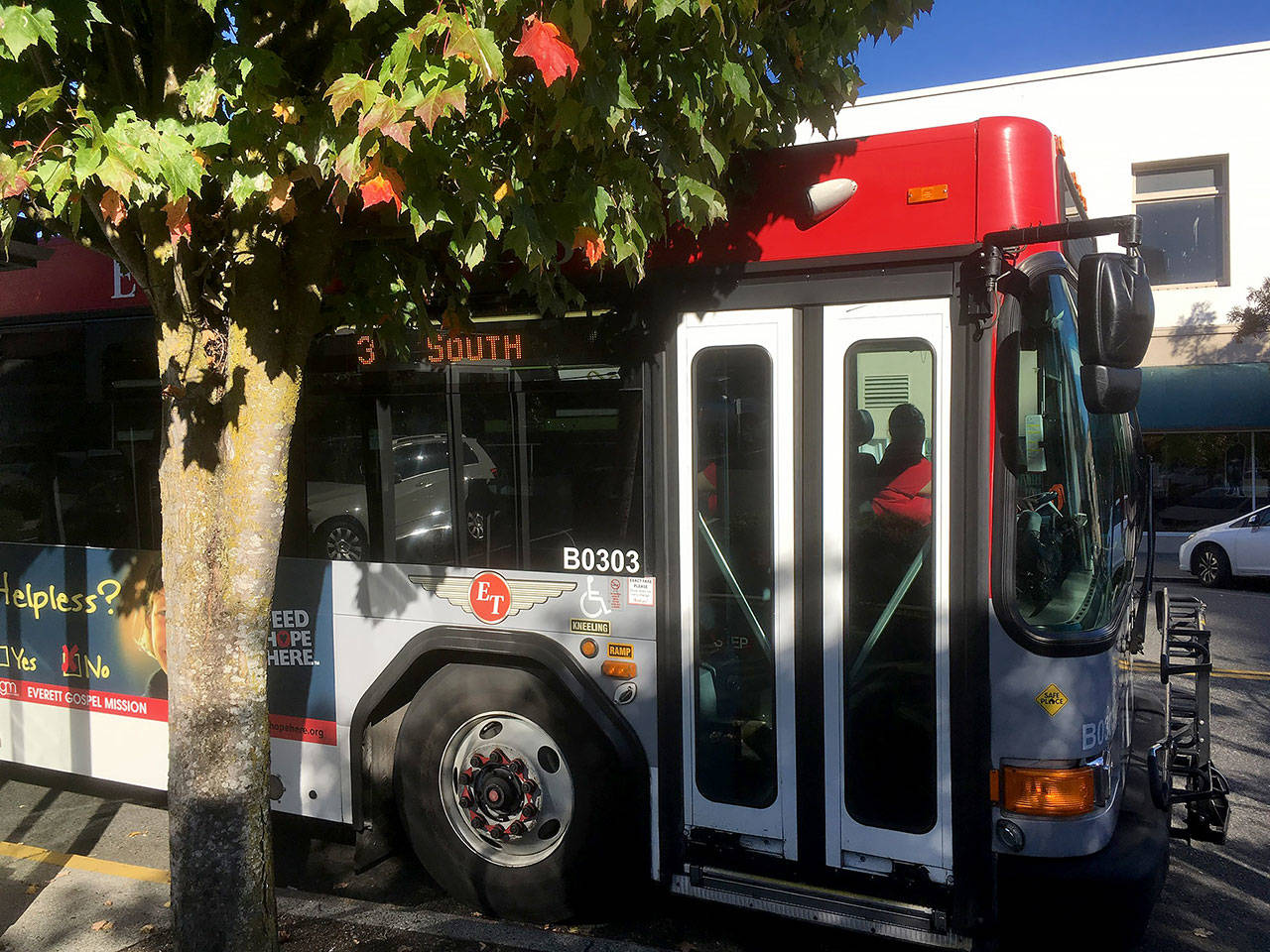Convenience, cost, frequency and range are at the heart of questions the City of Everett is asking in an online survey about the future of bus and para-transit programs.
The questions gauge each factor’s importance for Everett Transit as part of a years-long “Rethink Transit” process. The survey is up through April 5.
“Their information is what drives us,” transit Director Tom Hingson said of the public. “We need to know what people think.”
The city has pondered what to do with its transit department for years as revenue has fallen and inflation has continued. Everett Transit operates under an enterprise fund, outside the general fund of the city’s budget. Three options are being considered: keep things the same, grow through a sales tax increase or grow through a merger and a sales tax increase.
Everett started the planning and outreach program last year. Traditional in-person methods of collecting feedback — such as Everett Transit outreach coordinator Ryan Bisson speaking with riders on buses — have been difficult or prohibited during the COVID-19 pandemic. In lieu of those, Everett Transit sought input and published information online, and put up flyers in buses, at businesses and on transit stops.
So far, 208 surveys have been submitted, and Hingson said responses clearly favor the transit system growing.
“I think it’s safe to say that there’s an appetite for change,” he said. “As to which direction the change goes, I think that is still undetermined.”
The online open house and survey available through April 5 includes a video explaining options and their effects for riders in some scenarios. The survey involves 13 questions.
The total sales tax rate in Everett is 9.8%. Of that, 0.6% is marked for Everett Transit, or 60 cents on a $100 purchase.
Everett Transit’s options are:
• Stay with the current transit sales tax rate and have limited or slow service growth.
• Implement a sales tax increase to 0.9% to increase frequency and length of service.
• Merge with Community Transit, which would increase the transit sales tax portion to 1.2% and improve service but take the system out of Everett’s direct control.
Both growth options would go to voters as a ballot measure.
Everett residents, workers and voters likely have a decision ahead about the city transit agency’s future. Expenses including fuel, labor and maintenance have increased around 3% annually, compared to sales tax revenue growth around 2% or less, Hingson said.
“If the economy has struggles, our sales tax revenues reflect that,” he said.
Sales tax accounts for most of Everett Transit’s revenue. Fares are the second-largest source, but those were suspended during much of past year to allow for six feet of separation from drivers, who sit next to the fare box.
When sales have declined, city leaders have cut and shifted service, as they did after the Great Recession in 2008.
It happened in a dramatic way last year because of the pandemic. Route 6 to the waterfront was cut, as was Sunday service for most remaining routes. About 25% of transit employees were laid off or took voluntary separation agreements, Hingson said. This year’s transit budget dropped by over $3.1 million from last year, largely through employee cuts.
“For the folks continuing to rely on transit, it’s a problem,” said Katie Wilson, general secretary for the Transit Riders Union, an organization that advocates for transit users primarily in King County and Seattle.
She was not familiar with the specifics of Everett Transit but said riders are best served when the system is simple.
“It makes a lot of sense to have a regional, integrated transit system,” Wilson said. “I can understand the kind of reticence of Everett Transit to merging … but I do think there are definite benefits.”
In 2019, Everett Transit averaged around 120,000 passenger trips per day. During the pandemic, that number plummeted. Route 70 between the Mukilteo ferry terminal and the Seaway Transit Center near Boeing, for example, normally had four trips, with full buses each weekday, Bisson said. In the days leading up to suspension March 14, it averaged 11 riders per day.
“It’s not going to be like that forever,” Bisson said. “People are going to go back to work.”
With more people getting vaccinated and life returning somewhat to normal,
there has been more travel and vehicle traffic. Based on public input, Everett Transit has restored Sunday service, which was eliminated almost a year ago.
One difference between Community Transit and Everett Transit has been the city agency’s investment in electric buses. To date, Everett has nine battery-electric buses in service, two of which joined the fleet this week.
On Wednesday, the Everett City Council approved a contract to buy nine more electric buses from Gillig, a California-based bus manufacturer, and the necessary charging equipment for nearly $9.3 million. Most of the money is from a Federal Transit Administration grant and the rest is from a state Department of Ecology grant with matching funds. Hingson said he plans to ask the city for approval to buy 12 more by 2024, which would replace some of the fleet’s oldest buses, including ones that aren’t as accessible for people with mobility limitations.
Shortly after being hired, Community Transit CEO Ric Ilgenfritz said he wanted to “take a hard look” at replacing diesel buses with electric coaches.
Have a question? Call 425-339-3037 or email streetsmarts@heraldnet.com. Please include your first and last name and city of residence.
Talk to us
> Give us your news tips.
> Send us a letter to the editor.
> More Herald contact information.

























